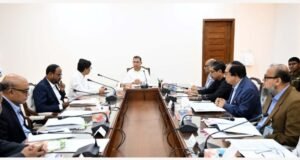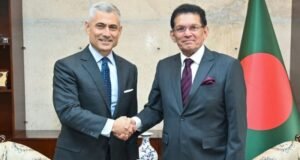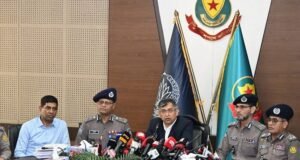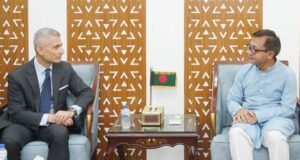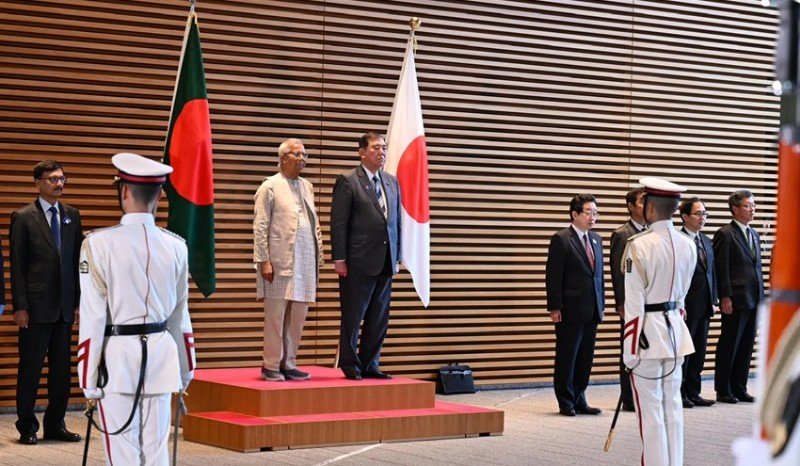
Japanese Prime Minister Ishiba Shigeru reaffirmed Japan’s full support for reform initiatives and nation-building efforts led by Bangladesh’s Chief Adviser Professor Muhammad Yunus during a high-level meeting held at Prime Minister’s Office on Friday morning.
In their discussions, Prime Minister Ishiba praised Bangladesh’s commitment to a peaceful democratic transition and expressed Japan’s continued solidarity with the country’s development goals.
The meeting reflected the longstanding friendship and strategic partnership between the two nations, which dates back to Bangladesh’s independence.
Both leaders underscored their shared commitment to a Free and Open Indo-Pacific (FOIP), emphasizing the need for peace, stability, and prosperity across the region.
They also discussed key international and regional issues, reiterating their support for multilateralism, democracy, and the rule of law under the principles of the United Nations Charter.
Professor Yunus expressed gratitude to Japanese government for its sustained development support, particularly under the Bay of Bengal Industrial Growth Belt (BIG-B) Initiative.
Notable among these projects is the Moheshkhali-Matarbari Integrated Infrastructure Development Initiative (MIDI), aimed at boosting connectivity and economic growth.
The two sides welcomed the recent signing of Exchange of Notes concerning the Development Policy Loan for Economic Reform and Strengthening Climate Change Resilience, as well as the loan agreement for construction of a dual gauge double rail line between the Joydebpur and Ishurdi sections.
In a joint statement, both nations highlighted the significance of recent MoUs and MoCs signed to facilitate Japanese investment in Bangladesh. These include agreements related to the One Stop Service (OSS) system in BIDA, installation of pre-paid gas meters, establishment of a battery-run cycle factory, a pilot project on information security, and land deals within the Bangladesh Special Economic Zone (BSEZ).
Both leaders emphasized the urgency of concluding a mutually beneficial Economic Partnership Agreement (EPA) and directed their respective ministries to accelerate the negotiation process.
On the defense and security front, the leaders welcomed progress in Japan’s Official Security Assistance (OSA) to Bangladesh, including the upcoming delivery of five patrol boats to the Bangladesh Navy. They also agreed in principle on an agreement concerning the transfer of defense equipment and technology, expressing optimism about an early conclusion.
People-to-people exchanges and cultural cooperation were also highlighted, particularly in areas of skilled labor and human resource development. Professor Yunus thanked Prime Minister Ishiba for Japan’s continued support through initiatives like the Human Resource Development Scholarship Program.
Prime Minister Ishiba also commended Bangladesh’s humanitarian efforts in sheltering forcibly displaced persons from Myanmar’s Rakhine State. Professor Yunus expressed deep appreciation for Japan’s humanitarian aid to these populations, including support for those relocated to Bhasan Char.
Both sides emphasized that a sustainable, safe, voluntary, and dignified repatriation of displaced persons to Myanmar is the only viable long-term solution. They called for sincere dialogue among all relevant stakeholders to resolve the crisis and restore regional stability.
Concluding the meeting, Professor Yunus extended a formal invitation to Prime Minister Ishiba to visit Bangladesh at a mutually convenient time. He also expressed heartfelt appreciation to the Japanese government and people for their warm hospitality.
The meeting was attended by Foreign Adviser Md Touhid Hossain, Chief Adviser’s Special Envoy Lutfey Siddiqi, Principal Coordinator on SDG Affairs Lamiya Morshed, and Press Secretary Shafiqul Alam, among others.
Earlier in the day, Professor Yunus received a ceremonial guard of honour upon his arrival at Japanese Prime Minister’s Office.
 Weekly Bangla Mirror | Bangla Mirror, Bangladeshi news in UK, bangla mirror news
Weekly Bangla Mirror | Bangla Mirror, Bangladeshi news in UK, bangla mirror news


